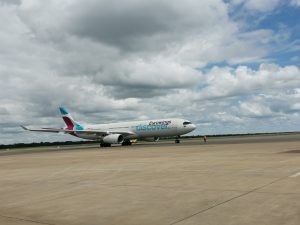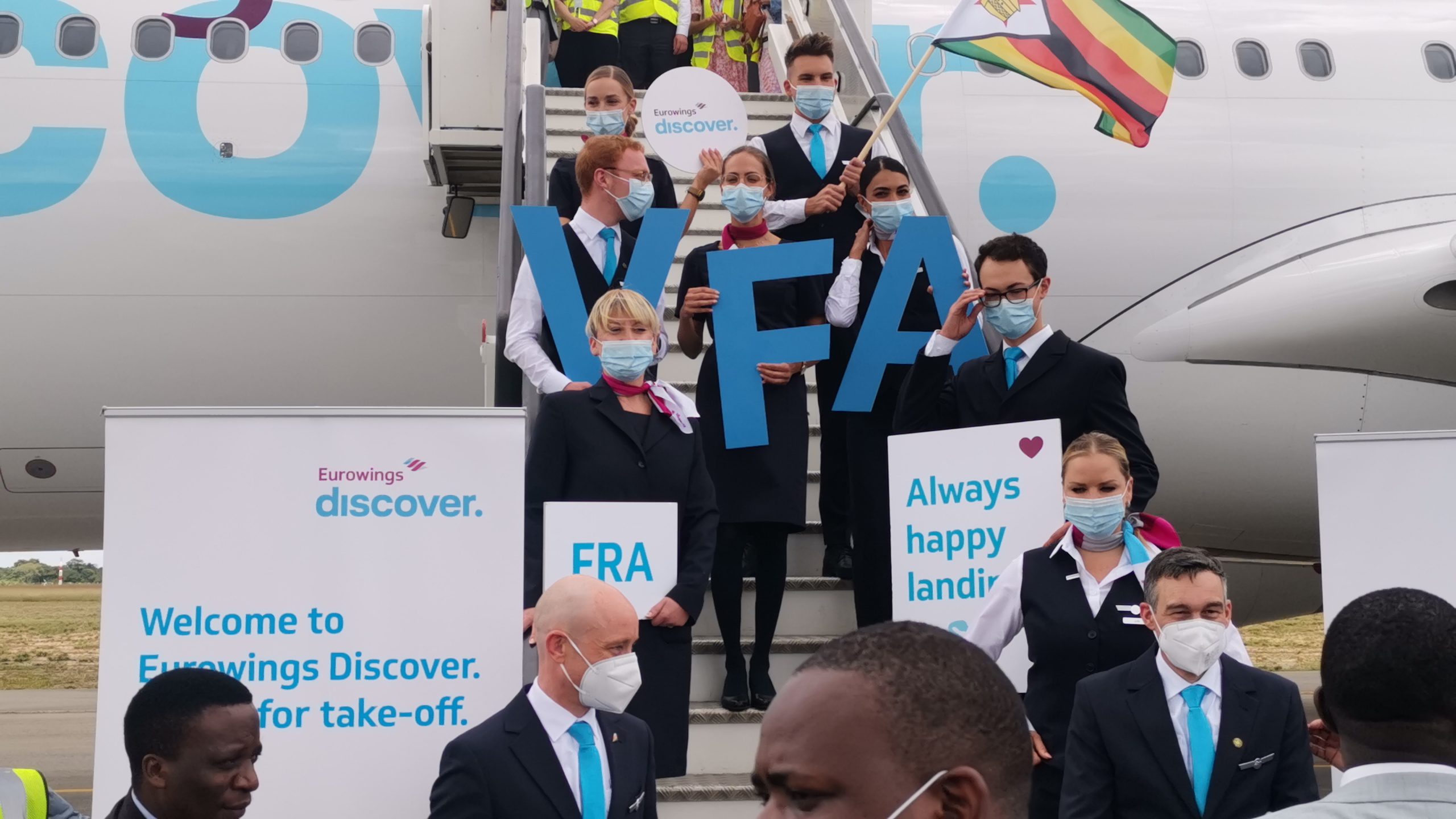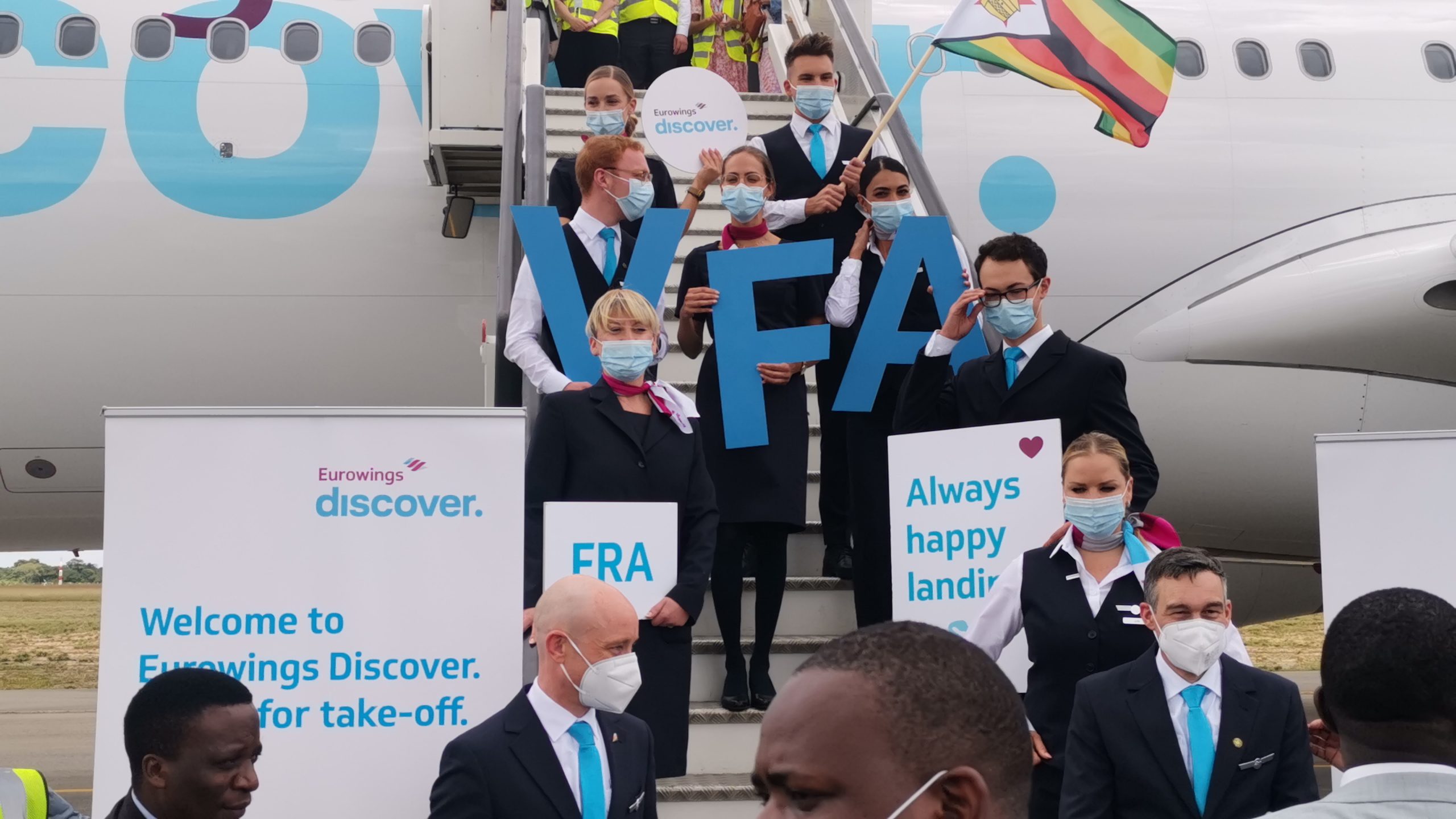BY NOKUTHABA DLAMINI
Top German airline Lufthansa returned to Zimbabwe on Wednesday after more than two decades with its leisure service Eurowings Discover touching down in Victoria Falls to mark the start of flights to resort city.
Eurowings became the first intercontinental airline ever to offer direct flights to Victoria Falls
The carrier departed from Frankfurt, Germany, on March 29 with an Airbus A330 and Flight 4Y138 arrived at the Victoria Falls International Airport at 11:15AM on time.

The Eurowings Discover maiden flight from Frankfurt, Germany, touching down in Victoria Falls on Wednesday
Captain Wolfgang Raebiger, who is also the chief executive officer (CEO) of the airline operated the first flight to Victoria Falls, which was welcomed by an airport event and special guests including the Germany ambassador to Zimbabwe Udo Volz.
“This flight marks a special milestone for our airline Eurowings Discover, “Raebiger said
“We are proud to be the first intercontinental airline offering direct flights to Victoria Falls as of today.
“It has never been easier for travellers from all over Europe to get to know this beautiful country, its culture and kind-hearted people and of course, the stunning natural wonder Victoria Falls.”
Raebiger said their booking figures showed that travellers from all over Europe were increasingly drawn to the vastness and beauty of the African continent and they were convinced that they will value Victoria Falls as a great and unique addition to their portfolio.
Eurowings Discover general manager Andre Schultz said with the launch of their Victoria Falls flights they were now able to offer their customers a direct connection between Europe and the diverse Kavango-Zambezi region.
“This area is of particular importance to our leisure airline Eurowings Discover as we continue expanding our portfolio into attractive tourist destinations in Africa,” Schultz said.
The Lufthansa Group said by introducing their new direct Eurowings Discover service to Victoria Falls, they were playing an active part in rebuilding Zimbabwe’s tourism industry those of neighbouring countries.
“Travel has become an important factor in the lives of many Germans,” the group said.
“Travellers from Germany constitute an important factor in the international tourism business.
“Zimbabwe, on the other hand, is an extremely beautiful and attractive destination in Africa, therefore, we very much welcome the fact that tourists from Germany venturing into Africa are now being provided a much easier access not only to the majestic Victoria Falls but to Zimbabwe altogether.”

Guests at a ceremony to welcome the maiden Eurowings Discover maiden flight pose for a picture at the Victoria Falls International Airport
Eurowings Discover starting March 29 will operate three weekly direct connections from Frankfurt to Victoria Falls, with return flights on Wednesdays, Fridays and Sundays.
The flights will be operated as tag flights with a short stopover in Windhoek.
“Through the integration into the Lufthansa network, passengers benefit from the direct connection to all German and European Lufthansa departure points as well as a continuous booking process and seamless transfer traffic,” Lufthansa said.
“Eurowings Discover will offer a high-quality product with many services included such as refreshments
“The aircraft offers up to 300 seats, up to 30 of which are in business class (full lie-flat seats), up to 31 in premium economy and up to 244 in economy.
“In all three classes, guests can look forward to a special, high-quality travel experience with all meals and non-alcoholic beverages included in the fare.
“Next to the culinary experience, Eurowings Discover also provides excellent entertainment onboard the flight to vacation – completely free of charge in all classes with their own screens in seat.
“Another special feature on board Eurowings Discover: guests can quickly and easily connect to the Onboard Cloud via their own device to receive an extended entertainment offer.”
“For now, the aircraft will continue doing three weekly direct flights from Frankfurt to Victoria Falls International Airport from March to mid-November 2022.

Eurowings Discover is the Lufthansa Group’s new leisure airline that flies travellers from the Frankfurt and the Munich hub to the world’s most beautiful short-, medium- and long-haul destinations.
Through integration into the Lufthansa network, travelers benefit from direct connections to all German and European Lufthansa departure points, as well as an end-to-end booking process and seamless transfers.
As a wholly owned subsidiary of Deutsche Lufthansa AG, the airline draws on the expertise and experience of one of the world’s leading aviation companies

 Slider3 years ago
Slider3 years ago
 National4 years ago
National4 years ago
 Tourism and Environment4 years ago
Tourism and Environment4 years ago
 Special reports4 years ago
Special reports4 years ago
 Opinion4 years ago
Opinion4 years ago
 National4 years ago
National4 years ago
 National3 years ago
National3 years ago
 National3 years ago
National3 years ago
















